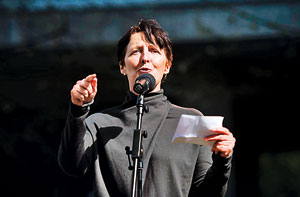Relishing the inimitable Shakespeare 400 years on

British actress Fiona Shaw reads Shakespeare’s Sonnet 55 during a ceremony to unveil a blue plaque near the site where playwright William Shakespeare took lodgings around 1604 in central London on April 21. AFP
It is a rare coincidence that William Shakespeare died on the very day of the calendar, namely April 24, exactly 52 years after his birth on April 24, 1564 at Stratford-on-Avon.
Originally introduced to Sri Lanka (then Ceylon) by the English educational authorities as examination texts for the examinations conducted by Cambridge and London Universities as time passed, the dramatist’s work was adopted by societies – a few of course – for school and public performances thereby leading to the Bard’s popularity in this country.
In some way or another, Shakespeare has been translated to so many languages that his plays are acted from Reykjavik in Iceland across oceans and continents in the Pacific Samoa as well. His popularity all over the world – English speaking and otherwise appears to be increasing with the passage of the years judged by the thousands of his devotees who on this very morning are crowding the streets of Stratford-upon-Avon, walking to the churchyard where his body had been interred 400 years ago as well as New Place, the house built by him in the latter years of his life and the imposing Shakespeare Monument put up by Shakespeare’s Society of Britain.
His life is an example of an individual who rose to the highest rungs of his career without a University education. He had to leave school at 15 with perhaps a sound grounding in Latin, Greek, English and Christian ethics. He married when 16, a lady eight years older than him and had three children – Susannah, Hamnet and Judith. The latter two were twins. Hamnet died in early childhood causing him great pain of mind and critics are of the view that the name Hamlet given to his play was an attempt to gain solace in respect of what he regarded as an irreparable personal loss.
Of Shakespeare himself, nothing or very little is known for the ten years following his marriage. However, it is believed that he had been a schoolmaster.
In or about 1589, the year following the victory by the English navy over the Spanish Armada, Shakespeare found himself in London, earning his living by acting in minor roles in plays and in a very short time, he had gained admission to a group called Lord Chamberlain’s Men which was later the King’s Men – given the fullest freedom to perform comedies, tragedies, moral and stage plays – in short, anything that would entertain England. Bear- baiting which had for a long time been the source of amusement to the rich and the poor was virtually becoming out-of-date.
In 1592, the Plague had broken out in London resulting in the closing down of all theatres. Shakespeare then turned to poetry. His first poem was Venus and Adonis to be followed by the Rape of Lucrece. Thereafter, Shakespeare started writing plays. His early plays were the three parts of Henry the Sixth, The Two Gentlemen of Verona, Titus Andronicus and then Hamlet in 1603. This was followed by Othello and King Lear. In all, he wrote 38 plays. However, a few, Cymbeline, The Winter’s Tale, A Midsummer Night’s Dream, Julius Caesar, As You Like It, and The Merchant of Venice and his last play, The Tempest need mention here as best known to Sri Lankan students and devotees. He is said to have commanded an extensive vocabulary, used about 29,000 different words in his plays and created nearly 2000 new words that have now seeped into the English Language.
It has to be remembered that while his plays attracted large numbers of drama lovers from all ranks of society, many playwrights found their plays were virtually unpatronised and performed in almost empty halls. Naturally, he faced professional jealousy. He had only one possible rival – Christopher Marlowe whose star was rising in the dramatic firmament. But when he died in a drunken quarrel, aged just 29, Shakespeare had an open unobstructed road to the highest position in English poetry and drama which remains unassailed even today.
When he retired to his birthplace around 1613, William Shakespeare was a rich man, the larger shareholder of the Globe Theatre where his plays were shown.
Even those who may be out of touch with his work, would do well to select any one of his plays and quietly read it, enjoying the story unfolded, the humour mostly of a refined nature, the different vagaries of character and most importantly, his poetry, sublime, unrivalled and inimitable even after the passage of four centuries.


